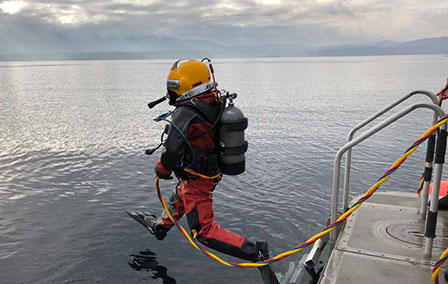Fifty per cent.

When B.C.’s RCMP dive team gets called out, 50 per cent of the time it’s to recover a body or bodies.
And the police officers doing the recovery are often doing so in terrible conditions: Murky water with zero visibility.
“They search by feel,” said the RCMP. “Divers are feeling for a body — victims of accidents or crimes — who are lost in lakes, rivers or the ocean.”

“We’re recovering bodies,” said Sgt. Steve Pebernat of the underwater recovery team. “The only comfort we have is that we are helping to bring closure to the families.”
One example police brought up was three people hiking a trail above Shannon Falls Provincial Park near Squamish.
RCMP say one person got too close to some swift water and was dragged down by a powerful current. Two people tried helping, but they too got swept over the falls, tumbling into a rocky pool 30 metres below.
Emergency crews and police rushed to the scene, with the search and rescue operation turning into a recovery mission after two days.
“The aerial extraction team used a rope-access system to lower us down into the pool where these people were located,” said Pebernat.
“Then air services used a longline to extract the bodies from the pool and off the side of the mountain. In all, we had over 100 officers and first responders with incredible skills working in extremely difficult terrain.”

Police say heavy water flow made it challenging, as the Shannon Falls runs through a number of pool systems.
“It was tragic,” said Pebernat. “Three young people lost their lives. It was one of the most complex calls that we’ve done for us to recover them.”
As to what police divers are doing the other 50 per cent of the time, it’s recovering evidence.
“When people commit crimes, they tend to throw items in the water and (the underwater recovery team) recovers the evidence,” said the RCMP.
“They have dived for the retrieval of bullets, cellphones, weapons, vehicles, boats, even planes, often using a metal detection device. They have been successful in recovering key evidence to further an investigation.”
In 2005, the RCMP opened the national underwater recovery training centre in Nanaimo. It’s the country’s only dive training centre dedicated to preparing police officers as underwater recovery and forensic specialists.

The five-week course, which includes swift-water rescue training, is said to be intense. And even if they pass, divers must attend annual training and recertification.
“We want everyone coming to the team to be a police officer first,” said Pebernat. “We want them to develop their skills as an investigator as well as a recreational diver. We train them to be a police officer underwater.”
During a dive, police say divers must carefully examine, photograph, survey and preserve evidence in accordance with judicial processes.
Pebernat says when a search is taking place, especially if it’s a recovery mission, the community shows up to support the team and the family of the victim.
“It’s tremendous to see that community connection and to be part of it,” said Pebernat, who’s been a police officer for 30 years, with 26 being on the dive team. He’s also been a recreational diver since 1993.

“You know, even though it’s a tragedy, it’s great to see such humanity come out to support the police in all our actions to recover the victim. To me, it’s very rewarding to have that recognition from the community in such a tragic time.”
The dive team can be called out to as many as 90 dives year. There are currently 24 members from across B.C. on the team, with dives normally consisting of three to five members.
Dives can range from three hours to a week, at any time. And police officers who join the team do so as part-time members.
Police say many team members are trained to operate remote vehicles, such as when water depths exceed a diver’s capability.
“Technology and equipment are used for diver’s safety,” said the RCMP. “They will put the equipment in places where they can’t go or where it is dangerous for divers to do the initial exploration.”

Sonar is also used to help locate objects, though sometimes it can’t help when it comes to depressions or craters on lake bottoms.
For example, police say in one case, a man drowned in Harrison Lagoon and it was tough to locate the body due to big potholes and zero visibility. Four days later, they found him.
“We changed from the typical pendulum search, where you arch from a central point, move up a few meters, and arch again,” said Sgt. Dennis Webber.
“Instead, we swam out to the furthest extent of the hardline cable connected to our vessel, and conducted a grid search from there. It was difficult, but we didn’t quit. We found the swimmer.”
In another case, police say a woman’s body was recovered from a deep lake after driving her truck off a cliff. The vehicle was located nose down in 140 feet of water, around 20 to 30 feet from shore.

“You have to use all of your skills to recover someone in that depth,” said Webber. “But we recovered her body.”
“When we go to calls, we always work in partnership,” added Pebernat. “Very rarely is it just us onsite; we assist the detachment in its investigation. For us to haul that truck out of the water, a lot of divers had to get down to the site, rig the vehicle and attach it to a cable that was connected to a crane on a barge.”
Dive team members say despite all the challenges they face, they love what they do — because they know it matters.
“It’s not a glamourous job. It can be miserable. But we’re invested,” said Webber.
“We want to bring the person back home to their loved ones. We never get tired of it.”





Comments